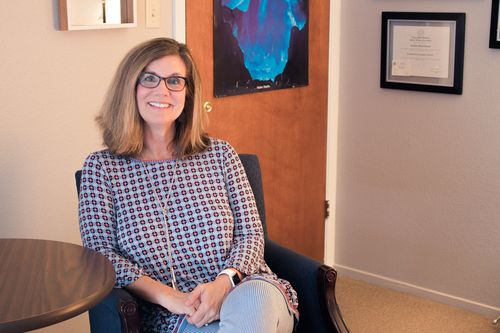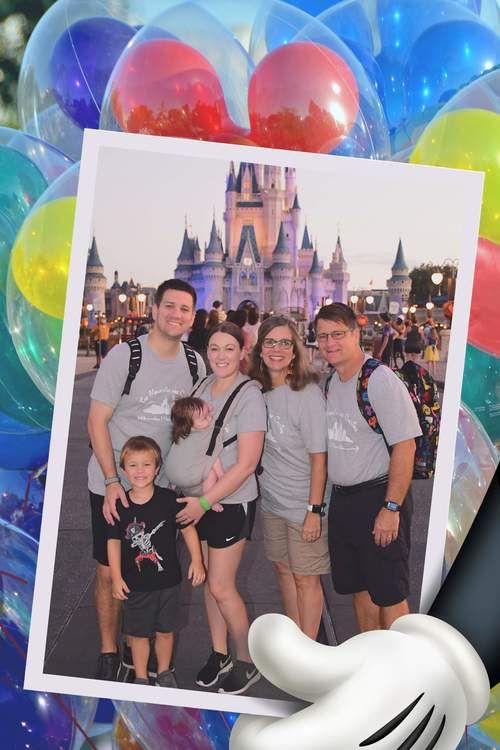My Favorite Things: Find the Cycle, Connect after Conflict

Carolyn Dixon, MSW, LCSW shares her favorite sayings and counseling interventions to help you live a more abundant life in her series entitled, “My Favorite Things.” Read on to learn more about Carolyn and her journey to becoming an Emotionally Focused Therapy (EFT) counselor, and hear her first tip for finding more connection in your relationships.
Right from the start, you need to know that I am big time Disney fan. My King Charles Cavalier is named Disney, and in my home, I have both a Magic Kingdom guest room and a Mickey guest room. I am sure that my love for Disney comes from my elementary years, when I lived in California and made many happy memories with my family in Disneyland. Anytime my family went to Disneyland, my dad LOVED it. He had grown up very poor in Canada and ended up being quite successful in the hotel business. He loved the hospitality, cleanliness, professionalism, entertainment, rides (especially) of Disneyland and of course seeing my brother and me so excited. My dad grew into “Bumpa” because my oldest son couldn’t say Grandpa, so Bumpa it was! In honor of Bumpa and our family’s love for Disney, I am entitling this blog series, “My Favorite Things,” after the song in The Sound of Music. In this series, I’ll share some of my favorite sayings and interventions, things I want my family and YOU to know that will help you to have an abundant life in relationships, passions, and work.
Recognizing Disconnection and Sadness Under Anger
I decided to become a counselor after finally finding healing and connection in my marriage. Donnie and I met when I was a freshman at Baylor University and he was a junior. He was my supervisor in my dorm’s cafeteria! We ended up getting married before my junior year, right after I turned 20, and we moved to Arlington so that I could finish my degree in Finance (long ways away from counseling) and so that he could attend seminary. A few months after we were married, I started to think I had made a huge mistake. I felt divorce wasn’t an option as a pastor’s wife. When I opened up to a friend about my unhappiness and she told someone else I didn’t want to know, I vowed that I would tell no one. By our seventh year as a married couple, Donnie and I had seen four different counselors and things still were not better for me. I really didn’t understand the problem. He was a super good guy, we had a great home, we had no financial problems, he was starting a new church in Cedar Park AND we had a baby. Still, I was unhappy and wasn’t telling anyone. Then, I attended a Mothers of Preschoolers (MOPS) group and David Ferguson from Intimate Life Ministries spoke. What he said resonated with me, and I decided to meet with him for counseling.
David Ferguson helped me to understand what my issue was: I was very disconnected in my thinking and feelings and had no idea how to share vulnerably. This was a huge insight and journey for me to work through. When I looked at a feeling faces sheet in counseling, I began to identify a variety of feelings in myself. I started to realize that under my anger and behaviors including rejection, no eye contact, coldness, and slamming cabinet doors, I was often hurting in some way. I like to use the target illustration from Kyle Miller, which I have in my office. At the outer edge of the target is BAD, for bad behaviors like slamming the cabinet doors. The next layer in is MAD, for angry feelings. I knew about my bad behaviors and angry feelings, but what I hadn’t yet realized was that underneath, at the center of that target, I was feeling SAD.
I remember very clearly my first encounter of identifying my SAD under the BAD and MAD outside of the therapy office. I was waiting for Donnie to get home and he was very late and hadn’t called me. I was exhausted from taking care of a 2-year-old and 2-month-old. I knew that I was feeling mad and had some bad behavior, like slamming the cabinet doors. I realized that there might be sadness underneath, and so I tried to think of what I could be sad about. I realized that I was hurt because I thought that I couldn’t really count on Donnie, and that made me feel insecure and all alone in the relationship. Normally in a situation like this, I would criticize, blame, and reject Donnie when he got home, and he would in turn get defensive (“I could have been in a car accident, and that is why I was late!”). Instead of this old behavior, I was able to try something new. I spoke the truth in love about my sadness, insecurity, and loneliness, and he was able to hear me and apologize. Instead of feeling more disconnected, we were able to reconnect.
Life is about RUPTURES AND REPAIRS. The bottom line is that the goal is not to never have a conflict. The goal is to know how to repair conflict. Trying to dissolve all of our relational problems is not a realistic option. In fact, “For any given couple,* happy or not*, 69% of our troubles will never go away. All contend with chronic issues from the annoying to the dire…" (1). Conflict is here to stay! It is about how you work through conflict that determines whether or not you will feel connected to your partner on the other side. This can give us hope.
Recognizing Disconnection and Sadness Under Anger
I decided to become a counselor after finally finding healing and connection in my marriage. Donnie and I met when I was a freshman at Baylor University and he was a junior. He was my supervisor in my dorm’s cafeteria! We ended up getting married before my junior year, right after I turned 20, and we moved to Arlington so that I could finish my degree in Finance (long ways away from counseling) and so that he could attend seminary. A few months after we were married, I started to think I had made a huge mistake. I felt divorce wasn’t an option as a pastor’s wife. When I opened up to a friend about my unhappiness and she told someone else I didn’t want to know, I vowed that I would tell no one. By our seventh year as a married couple, Donnie and I had seen four different counselors and things still were not better for me. I really didn’t understand the problem. He was a super good guy, we had a great home, we had no financial problems, he was starting a new church in Cedar Park AND we had a baby. Still, I was unhappy and wasn’t telling anyone. Then, I attended a Mothers of Preschoolers (MOPS) group and David Ferguson from Intimate Life Ministries spoke. What he said resonated with me, and I decided to meet with him for counseling.
David Ferguson helped me to understand what my issue was: I was very disconnected in my thinking and feelings and had no idea how to share vulnerably. This was a huge insight and journey for me to work through. When I looked at a feeling faces sheet in counseling, I began to identify a variety of feelings in myself. I started to realize that under my anger and behaviors including rejection, no eye contact, coldness, and slamming cabinet doors, I was often hurting in some way. I like to use the target illustration from Kyle Miller, which I have in my office. At the outer edge of the target is BAD, for bad behaviors like slamming the cabinet doors. The next layer in is MAD, for angry feelings. I knew about my bad behaviors and angry feelings, but what I hadn’t yet realized was that underneath, at the center of that target, I was feeling SAD.
I remember very clearly my first encounter of identifying my SAD under the BAD and MAD outside of the therapy office. I was waiting for Donnie to get home and he was very late and hadn’t called me. I was exhausted from taking care of a 2-year-old and 2-month-old. I knew that I was feeling mad and had some bad behavior, like slamming the cabinet doors. I realized that there might be sadness underneath, and so I tried to think of what I could be sad about. I realized that I was hurt because I thought that I couldn’t really count on Donnie, and that made me feel insecure and all alone in the relationship. Normally in a situation like this, I would criticize, blame, and reject Donnie when he got home, and he would in turn get defensive (“I could have been in a car accident, and that is why I was late!”). Instead of this old behavior, I was able to try something new. I spoke the truth in love about my sadness, insecurity, and loneliness, and he was able to hear me and apologize. Instead of feeling more disconnected, we were able to reconnect.
Life is about RUPTURES AND REPAIRS. The bottom line is that the goal is not to never have a conflict. The goal is to know how to repair conflict. Trying to dissolve all of our relational problems is not a realistic option. In fact, “For any given couple,* happy or not*, 69% of our troubles will never go away. All contend with chronic issues from the annoying to the dire…" (1). Conflict is here to stay! It is about how you work through conflict that determines whether or not you will feel connected to your partner on the other side. This can give us hope.

Case in Point: The Toothpaste Argument
Fast forward 30 years, Donnie and I just had a very similar fight about TOOTHPASTE! We had been traveling on the weekends and he kept taking the tube of toothpaste that we share. I had asked him to leave that tube in the drawer and put another tube in his overnight bag so that when I went to brush my teeth, I didn't have to go to the other bathroom to get it. I thought all was good until Monday morning. I went to brush my teeth and guess what? There was no toothpaste! We went round and round. I was critical and negative in my tone: “I thought we were on the same page but clearly we aren’t!” He was defensive: “It’s only toothpaste, why are you making this a big deal?” Later, I thought about what was really bothering me in those moments. Our cycle is the same, no matter what the fight is about. It goes like this:
When I am critical, blaming, and attacking, underneath I feel sadness and fear. I feel insecure and afraid that I am always responsible for everything and all by myself. When I am critical, Donnie gets defensive, but underneath, he feels like he is never good enough for me and fears rejection. This is called our “cycle.” No matter the disagreement, we fall back into this pattern. 80% of couples share this same pattern, and in Emotionally Focused Therapy (EFT), we call it “Pursue/Withdraw.”
Learning more about our own inner experiences and our Pursue/Withdraw cycle as a couple helped Donnie and me to resolve conflicts much differently. When we can catch ourselves in the cycle, we can tap into what’s underneath and find the comfort and connection that we both want. These learning experiences after so much loneliness and unhappiness in earlier years have made me passionate about counseling and especially about Emotionally Focused Therapy (EFT). EFT is the kind of therapy that I use to help couples find out why they are stuck and reconnect as they create a new kind of relationship.
So, the next time you argue, try to ask yourself, “what’s under the BAD and MAD for me?” Take the risk to share it with your partner. You might be surprised with how differently the argument ends.
I am looking forward to what comes up in the next My Favorite Things blog. I hope to see you then!
Take care,
Carolyn
(1) "Solving Your Unsolvable Problems: What Happy Couples Know"
Fast forward 30 years, Donnie and I just had a very similar fight about TOOTHPASTE! We had been traveling on the weekends and he kept taking the tube of toothpaste that we share. I had asked him to leave that tube in the drawer and put another tube in his overnight bag so that when I went to brush my teeth, I didn't have to go to the other bathroom to get it. I thought all was good until Monday morning. I went to brush my teeth and guess what? There was no toothpaste! We went round and round. I was critical and negative in my tone: “I thought we were on the same page but clearly we aren’t!” He was defensive: “It’s only toothpaste, why are you making this a big deal?” Later, I thought about what was really bothering me in those moments. Our cycle is the same, no matter what the fight is about. It goes like this:
When I am critical, blaming, and attacking, underneath I feel sadness and fear. I feel insecure and afraid that I am always responsible for everything and all by myself. When I am critical, Donnie gets defensive, but underneath, he feels like he is never good enough for me and fears rejection. This is called our “cycle.” No matter the disagreement, we fall back into this pattern. 80% of couples share this same pattern, and in Emotionally Focused Therapy (EFT), we call it “Pursue/Withdraw.”
Learning more about our own inner experiences and our Pursue/Withdraw cycle as a couple helped Donnie and me to resolve conflicts much differently. When we can catch ourselves in the cycle, we can tap into what’s underneath and find the comfort and connection that we both want. These learning experiences after so much loneliness and unhappiness in earlier years have made me passionate about counseling and especially about Emotionally Focused Therapy (EFT). EFT is the kind of therapy that I use to help couples find out why they are stuck and reconnect as they create a new kind of relationship.
So, the next time you argue, try to ask yourself, “what’s under the BAD and MAD for me?” Take the risk to share it with your partner. You might be surprised with how differently the argument ends.
I am looking forward to what comes up in the next My Favorite Things blog. I hope to see you then!
Take care,
Carolyn
(1) "Solving Your Unsolvable Problems: What Happy Couples Know"

Carolyn Dixon has been with ALCS since 2004 and counsels clients from our North Austin location. She is trained to counsel individuals, couples, and families with a range of issues including anxiety, loneliness, anger, grief and loss, parenting and family challenges, premarital and marital issues, and divorce recovery. Carolyn has a passion for strengthening marriages and is certified in Emotionally Focused Therapy (EFT), an intervention that is based on scientific study of adult love and bonding processes in couples. For more information about Carolyn's practice or to set up an appointment with Carolyn, call us today!
Further Resources:
Love Sense: The Revolutionary New Science of Romantic Relationships, by Sue Johnson
Created for Connection: The "Hold Me Tight" Guide for Christian Couples, by Sue Johnson with Kenneth Sanderfer
Love Sense: The Revolutionary New Science of Romantic Relationships, by Sue Johnson
Created for Connection: The "Hold Me Tight" Guide for Christian Couples, by Sue Johnson with Kenneth Sanderfer

Family fun at Disney!
Posted in Blogs by Carolyn, COVID-19, Marriage, My Favorite Things
Posted in My Favorite Things, anger, Christian counseling, Christian therapy, communication, connection, EFT, relationships, therapy
Posted in My Favorite Things, anger, Christian counseling, Christian therapy, communication, connection, EFT, relationships, therapy
